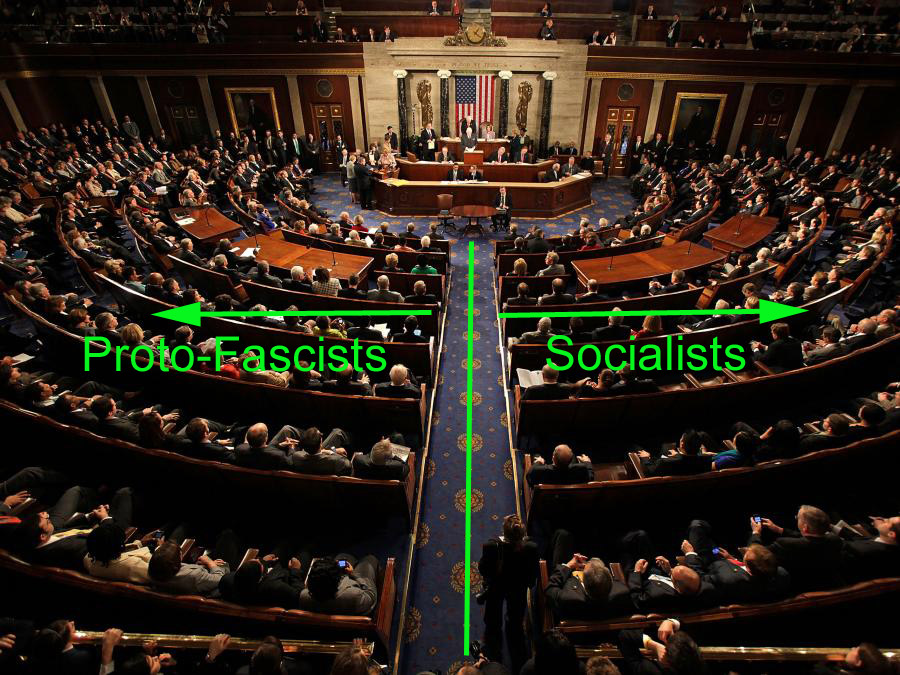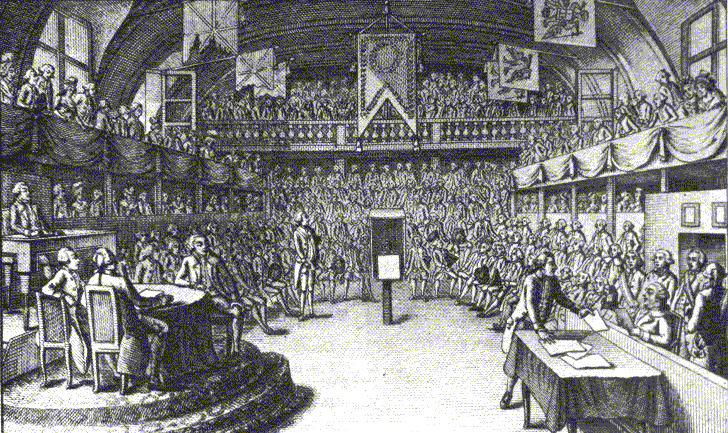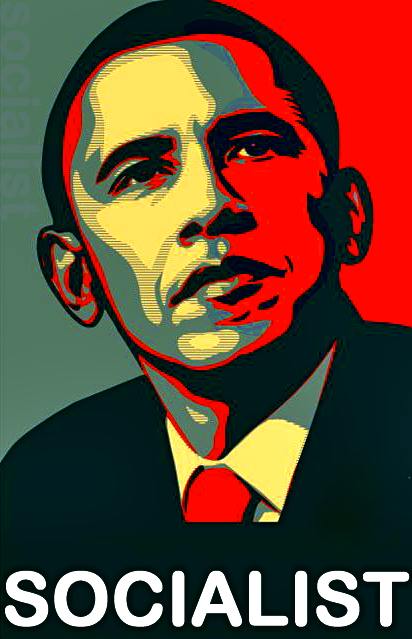I lose track of the number of times someone has called me a “leftist” because of my views on social justice, privacy, demilitarization, and opposition to weapons of mass destruction. And I have no idea how many times I’ve been referred to as a “right winger” because I own firearms and am generally suspicious of authority. But actually my suspicion of authority is suspicion of everyone, and it’s only authority that I worry about – and it all gets complicated. When I was in college and someone asked me to label myself, I sometimes would say “I am a radical righto-leftist.” That’s the sort of thing that seems funny when you’re a sophomore (hence the label: sophomoric) but, like most other labels, it wears out.
It was, in fact, the right/left divide that first led me into challenging the use of labels in politics, which led me to linguistic nihilism.[stderr] For the sake of this posting, let’s not go down into linguistic nihilism because then the words on your screen become nothing but meaningless goo goo gaa gaa, and there’s already too much of that going on in politics right now.

Have you ever been labelled as a leftist or a rightist? And, if you have, did you wonder where that comes from? Did you, perhaps, think it has something to do with which side of the Congress Hall you sit on. Of course, that’d be the Congress Hall in Philadelphia, not Washington.

Assemblée Nationale dans la Salle du Manège aux Tuileries
Actually, it’d be which side you sat on in the Salle De Manege at the Tuileries in Paris, if you were participating in the various French attempts to construct a government before, during, and after the revolution. [wikipedia] There was a seemingly endless series of divisions, factions, purges, terrors, and counter-purges, so that it was confusing, and became useful for people to generally sit on one side of the room or the other to indicate where they stood against or for the prevailing establishment – which is a tricky proposition when you’re in the middle of establishing the establishment. So, roughly, the divisions broke along lines whether you were anti-noble, anti-clerical, generally egalitarian, and in favor of a republican form of government – or not. A real problem immediately becomes obvious: there are way more factions than there are sides of room. If only the French had established the assembly in an octagonal horse-barn or something that permitted a more nuanced political self-identification! (“I am an eleven-o’clockist!” Ranum declared proudly. “SCUM!” shouted the entire six o’clock bench in reply.)

The critics actually gave “Danton” pretty good reviews. Not like this.
On the left you usually had the Jacobins – the famous Club Jacob [Not to be confused with a popular Irish biscuit] – the Jacobins were, at least at first, the “winners” in the revolution, but they broke quickly into a spectrum in terms of their preference around the degree to which the nobles were to be disempowered, or property redistributed, and what about the clergy, etc? The Terror, which most of us Americans know as the nobles being sent to the guillotine, was followed by mini terrors or internal purges, as various factions within the ‘Left’ (the “winners”) turned on eachother. That’s where you had events that have filtered down to us through popular media, like Marat’s assassination and Danton’s defeat by Robespierre, which resulted in Gerard Depardieu being guillotined in 1983. [If you like costume drama, it’s worth a watch: wikipedia] Robespierre later lost out, too, and wound up going the same route as Danton. Revolutions are problematic: there’s an inner dynamic that it’s easy to get everyone to agree that the establishment needs to be overthrown, but then the knives come out – literally – over what should go in its place.
At the back of the assembly hall was a tall bank of bench seats – what today we’d call “bleachers” where the Girondins – leftists that overlapped the Jacobins – sat: La Montagne (the mountain, because: tall) – most of the bloody purges in the French Revolution, after the low-hanging fruit of the nobility went to the guillotine, were between various Jacobins and Girondins. All “Leftists”! The “Right” had already been decimated, and mostly consisted of pro-nobles and even proto-monarchists, who largely wanted their country back and variously conspired to invite back the king or establish a constitutional aristocracy.

You say that like it’s a bad thing
The point of all of this is that it doesn’t map particularly well to the Left/Right divide that politically naive ideologues talk about today. Today we’d probably characterize the Right as “reactionary”, “conservative”, “establishment” whereas in post-revolutionary France, everybody was “reactionary” and “anti-government” depending on which day of the week it was. Today we might characterize the Left as “egalitarian” (or “socialist” if you’re a politically naive American) and “anti rich” or even “anti government” – but in post-revolutionary France it was the Left that was chopping people’s heads off. Until the Left started chopping the less Left’s heads off, and then the nihilist proto-dictators led by Talleyrand and Bonaparte made the standard appeal of dictators: stability (at a price) and Make France Great Again (at a price) plus a whiff of grapeshot.
The Left/Right divide, as we see it today, is a product of propaganda and little else. People who use the terms are usually allowing their natural enemies to define their language, which is tantamount to allowing them to establish their thinking for them. Per Argument Clinic, Left/Right is labelling [stderr] and is a dishonest move that ought to be vigorously counter-attacked when you encounter it. If you want to tie your opponents’ brain into a knot, I suppose you could invest the effort to learn enough about pre- and post-revolutionary French politics, that when someone calls you a “Lefty” you could say “No! I am a Jacobin! Are you a Girondist Montagnard!? Or are you a monarchist?” The problem is that your interlocutor will almost certainly have no idea what you’re talking about, because they almost certainly have no idea what they’re talking about, either.

“… tantamount to allowing them to establish their thinking..” – I guess I side with Chomsky on the degree to which language forms our thoughts. For abstract thinking such as thinking about politics, it seems to me that your language frames your thinking which frames your language. So, if I can establish the frame in your mind that “Socialists are bad” and then “Leftists are sometimes Socialists” then I have moved you a few steps toward “Leftists are bad” without having to make an argument. If I then call Marcus a Leftist, I’ve made a connection, however tenuous, that Marcus is bad because [citation needed]. This is the essential “bait and switch” of propaganda and marketing and it appears to me to be an exploit in how we think and how we use language to think.
I was tempted to frame all of this in terms of the Left/Right divide historically wound up serving Bonaparte, the same way the Red/White divide in Russia wound up serving Stalin, but that’s unfairly simple. Some of the people who use these terms mean them – they’re just naive, and they’ve been propagandized into allowing themselves into being manipulated through labels.

A well-known example of the confusion over the language of politics is the word “Bolshevik”, which many assume to be a synonym for extremism, but in the mundane sense simply meant “majority”.
Identity is a big deal here. My wife just finished a fascinating book called Switch, about how change in people and organizations occurs.
To oversimplify vastly, identity plays a big role. People run their lives, including things like voting, based largely on identity. It’s a handy shortcut for decision making, and it probably works brilliantly for hunter gatherers.
Labeling in the right/left sense is, it strikes me, mostly about identifying people as in the tribe, or out.
My guess, Marcus, is that they are usually labelling you as Out ;)
Identity is also one of the best handles. ‘people like us vote X’ and ‘people like us buy Tide’
Andrew Molitor@#2:
I’ll buy a copy of that; it sounds interesting.
Identity is also one of the best handles. ‘people like us vote X’ and ‘people like us buy Tide’
… which I simplify to: we humans are nowhere near as smart as we think.
polishsalami@#1:
A well-known example of the confusion over the language of politics is the word “Bolshevik”, which many assume to be a synonym for extremism, but in the mundane sense simply meant “majority”.
See, now I didn’t know the last part of that (“majority”) but I never thought the first. I always assumed “Bolshevik” was a label for a political agenda, like “Jacobin” or “Bonapartist”
Calling oneself the “Majority” is a good move. Like “Freedom Party” and “Pro Life”
Someone needs to start a political party called “9 out of 10 doctors”
Marcus Ranum @#3
I tend to think that most people can be pretty smart, but thinking about everything in depth is difficult and exhausting, so people fall back on shortcuts like following a group that one identifies with. Also, emotions often overwhelm rational thinking, and identity politics appeals to emotions.
Bolshevik is derived from Bolshoi = big/large (as in Bolshoi Ballet, Bolshoi Theatre which the Big Ballet and the Big Theatre).
Menshevik is derived from Menshiy = small.
The Bolsheviks where the bigger part of the split of whatever broke into the Bolshevik/Menshevik parts.
And now to do a bait and switch, I’ll put the word Bolshoi in Russian to exchange Cyrillic and the appearance of knowledge, for you know, real learning: вольшой. Ta da! Pseudo-intellectual!
People can be smart, but nobody can function without heuristics. Imagine sub-genii like me trying to work out the full logical implictions* of taking a dump a la Kurt Goedel working out the logical implications of the US constitution. I’d die of impacted bowel before I got past determining if the S-bend was the optimal shape….
*I’m not arguing we can’t improve our reasoning, just that for a lot of tasks it isn’t worth it, and let the experts decide. I consider myself a progressive/leftist/socialist more than a conservative/authoritarian/rightwinger, but only because I’m lazy, and most of the progressivey talking points I agree with. Still, I find a lot of parties called left, like Labor in Oz and the Dems in the US are what I’d call center-right, they support neo-liberalism and have battles over the size of health care and engage in enabling rent-seekers and so on. They’re not left enough for me! Where’s my trusty Guillotine on the go?
Brian English @ # 6: The Bolsheviks where the bigger part of the split of whatever broke into the Bolshevik/Menshevik parts.
According to several histories of the Russian Revolution(s) which I read quite a while back (and so cannot cite without more digging than I have time for at the moment), Lenin lied when he dubbed his own faction the “Bolsheviki” [literally, “men of the majority”] of the [anti-czarist] opposition – but the label became a self-fulfilling prophecy, and a perfect example of manipulating power by words.
@ Marcus
Re Bolshevik
I see Brian beat me but what the heck
Bolshevik is just a derivation (?) from “bolshoi” , (Большой) English = ‘big’. It was adopted by Lenin or one of his social marketers to describe their faction so as to imply that their faction was the biggest ( as polishsalami says “majority”) even though I don’t believe they were the largest faction.
In English the term took on the “extremism” connotation, presumably because almost no English-speakers in the 1920s and 30s spoke Russian.
The famous Bolshoi Ballet translates as “The Big Ballet”.
jrkrideau@#9:
“The Big Ballet”
Well, it sounds like a good punk band name. Or maybe a gangster movie starring Chow Yun Fat.
(Большой) English = ‘big’.
Haha, fuck I’m a tool!
Even when trying to be ironically clever I fuck the spelling,
I have a bolshoidick.
Aww. C’mon. We were all thinkin it. Right?
Right?
Brian English@#11:
(Большой) English = ‘big’.
Please stop using Russian here, the FBI is going to start surveilling us as a nest of Russian hackers and the next thing you know you’ll have a cool name like “Bolshoi Bear” and your phone will never work right again.
Andrew Molitor:
He has a wife, you know….? Her name is Nederzhaniye Mochi, which google translate assures me is Russian for “Incontinentia”
Ok, not sure if you’re serious, but don’t want to be banned by a 10th dan Ninja in computer security. You might mess with my dongle or something.
Brian English@#14:
Not serious at all. I was poking fun at the US intelligence community’s prediliction for attributing attacker origin based on the flimsiest use of language.
The first rule of dongle club is, uh, it’s all good fun until someone puts an eye out.
All good then. Perhaps you were getting annoyed with my amusing myself with my spelling errors in Russian.
It doesn’t matter what language, I can butcher it!
I believe the context translates Bolshoi Ballet into “The Grand Ballet”, which sounds a little better (besides, grand = big anyway…).
I’m pretty sure that’s the idea, it’s more of a political label than an actual indication of majority (at least at this point in time).
Also, I didn’t know Bolsheviks were seen as extremist by default, so I’ve never made the association between them and extremism – is this a common assumption? (Revolutionaries, yes – extremists, as I always understand the term, not necessarily.)
Taking a shortcut to identity tagging instead of thinking things through is more detrimental than it sounds. Identity labels are the primary reason people do NOT listen to new evidence even when it’s abundantly clear that evidence contradicts something they’d previously decided to casually identify with.
Can’t be helped though, really. I had religion classes starting with first grade. I didn’t get generally applicable logic classes that stuck until a mass media class in high school did a great job of teaching me how to notice cheap advertising tricks and unravel them. By the time I had a real logic class in college it never had a chance to change how I constructed my viewpoint of the world.
Yes, categorising political stances via a single axis is too simplistic.
Alternatives exist, of course.
( https://en.wikipedia.org/wiki/Political_spectrum#Other_proposed_dimensions )
@ 17 rq
I believe the context translates Bolshoi Ballet into “The Grand Ballet”, which sounds a little better (besides, grand = big anyway…).
Well yes, but I was too tired/lazy to point it out and in the context “Большой балет” of the postings Big Ballet was too good to miss.